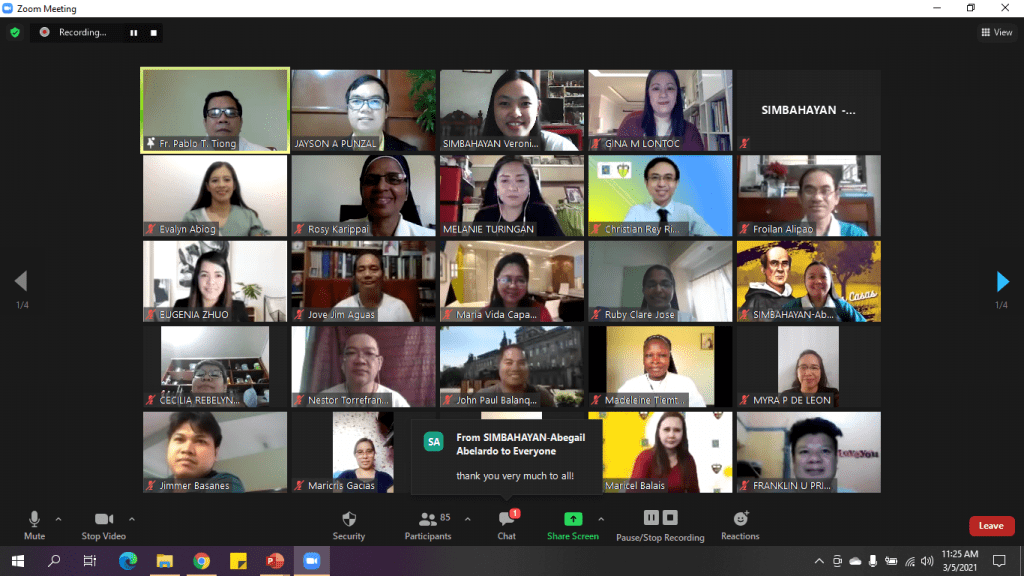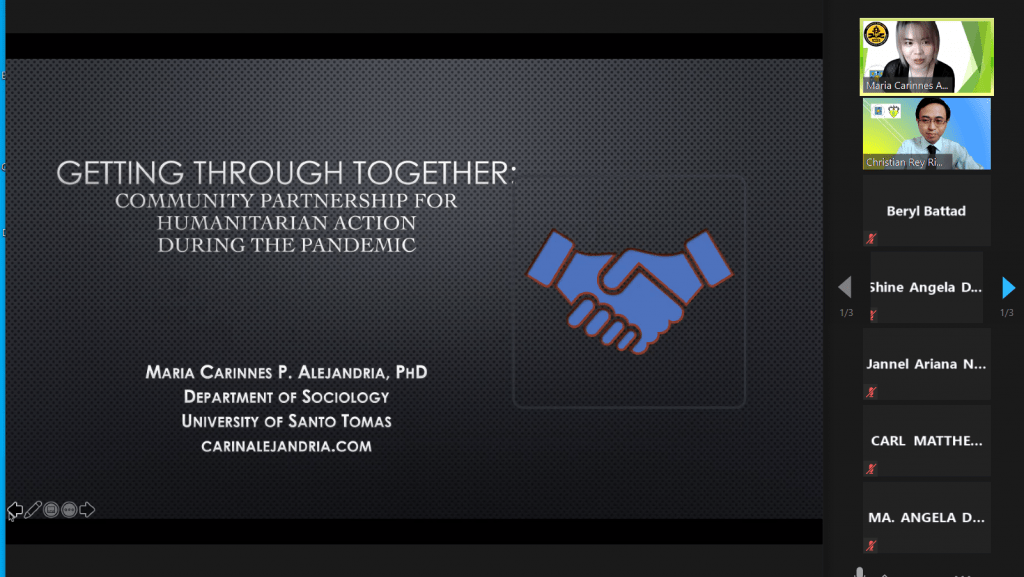With this year’s theme, “Conducting Community-Engaged Research in Exploring the COVID-19 Pandemic Response,” the UST SIMBAHAYAN Community Development office in collaboration with the Office of the Vice-Rector for Religious Affairs (OVRRA), Research Center for Social Sciences and Education – Community-Engaged Studies Research Interest Group (RCCSED – CEnS RIG), and Central Student Council (CSC) held the “Bartolome de las Casas Research Conference 2021” on March 5, 2021, via Zoom. The whole day conference was the final event for the Fr. Pedro Salgado, OP Social Justice Week. The morning session was for the faculty researchers, while the afternoon session was allotted to the student presenters.
The session was formally opened by the SIMBAHAYAN Director Asst. Prof. Froilan Alipao, who shared a brief description of the Fr. Pedro Salgado, O.P. Social Justice Week, as well as the life and advocacy of Bartolome De Las Casas, O.P., particularly on the rights of native Americans and the Salamanca Process. He also stressed that the spirit of research would lead us toward pandemic response. Vice Rector for Religious Affairs Rev. Fr. Pablo Tiong, OP, was present to give his Words of Appreciation.
The plenary assembly of the morning session was a presentation on telemedicine titled “Telemedicine: Bridging the gap in health care access and medical education” delivered by Assoc. Prof. Ma. Teresa Tricia G. Bautista, M.D., from the Faculty of Medicine and Surgery. She presented the survey results they have gathered regarding people’s awareness of telemedicine and emphasized its importance amidst the pandemic.
The conference had five Parallel Sessions that focused on Community-Action Research, Community-Based Pandemic Response, Reflections on Engagement, and Community Studies.
Presenters for Session 1 were Asst. Prof. Gina M. Lontoc, Ph.D., Sr. Ruby Clare Jose, O.P., Sr. Madeleine Tiemstore, O.P., from the RCSSED. Their paper was titled “The ties that bind: Exploring synergies in community development programs and multi-stakeholder collaboration.” Another presenter was Asst. Prof. Ronald Castillo, also from the RCSSED and the Faculty of Arts and Letters discussed research emerging from an immersion of community development coordinators from different universities in the Philippines. The research was titled “Rapid Rural Assessment on Community Organizing at Brgy. Sibulan, Nagcarlan, Laguna.”
Papers presented in Parallel Session 2 delved on Community-Based Pandemic Response. Asst. Prof. Ma. Carinnes P. Alejandria Ph.D., from the RCSSED and the Faculty of Arts and Letters, presented her paper, “Getting through together: Community partnership for humanitarian action during the pandemic.” Asst. Prof Christian Rey D. Rimando showcased their experience in conducting research-related activities through his paper titled, “Initiating community-engaged research during pandemic: A CRS experience.”
In Parallel Session 3, the papers centered on the Reflections on Engagement. Asst. Prof. Froilan Alipao, from the SIMBAHAYAN and RCSSED presented “Ang paghahanap ng pamamaraan ng pagtugon sa paglilingkod at pagpapaunlad sa gitna ng pandemya: Isang munting pagsasalarawan sa UST-SCDO at mga katuwang.” Another presenter was Mr. Tyrone Jann DC. Nepomuceno, who discussed “Praxis of faith: A comparative study of the Filipino Dominicans and Redemptorists’ on-going response to the COVID-19 crisis.”
Parallel Session 4 concentrated on Community Studies. Asst. Prof. Melanie D. Turingan, Ph.D. of the Faculty of Arts and Letters and the RCSSED presented her paper titled “Transcending the human self: The impact of the certificate course in community engagement and organizing on a selected community extensionists.” Another speaker was Asst. Prof. Evalyn B. Abiog, Ph.D. who shared her study on Ayta Mag-Antsi, titled “More than words: The morphology and language documentation of an indigenous language in the Philippines.”
Although Parallel Session 5 was also focused on Community Studies, the papers presented were on technology and tourism. One study presented was Ms. Eugenia R. Zhou from the Institute of Information and Computing Sciences, who shared her research on a robot that can aid Filipino farmers through their “Amaize V2.0: Automated maize seeds sowing robots.” Mr. Jame Monren T. Mercado who represented the College of Tourism and Hospitality Management, RCSSED, and the Graduate School- Center for Conversation of Cultural Property and Environment in the Tropics, presented his study, “Taoid: Sustaining communal heritage and tourism through multi-stakeholders approach – The case of San Nicolas, Ilocos Norte, Philippines.”
The afternoon session was dedicated to five astounding community-engaged research studies by students. The first student research presented, “Perceived public stigma and self-stigma as predictors of willingness to seek counseling among public officials in Metro,” was the research study of Ms. Althea Mangasar, Mr. Marynard Froy Neri, Ms. Karyna Aylin Santillan, Ms. Maui Kayle Wei, and Assoc. Portia Lynn Q. See, Ph.D., from the Department of Psychology, College of Science.
The second research was the “Employability of persons with disabilities: Perception of employers in hiring persons with disabilities in Barangay Concepcion Pequena, Naga City, Camarines Sur.” The authors were Mr. Miguel Alfonso P. Cachapero, Mr. Paolo Jose A. Lorenzo, Ms. Danelle Bernedette G. Naoe, Ms. Roxanne S. Sabido, Ms. Vanessa Joy R. Mesa, Ms. Cianna Christine A. Sumayo, and Ms. Cherry May A. Gabuyo, from the Department of Occupational Therapy, College of Rehabilitation Sciences.
The third study, “Effects of ISALBA: A comprehensive disaster educational program on the knowledge, skills, and attitudes among Filipino informal settlers” was the research of Ms. Cherish Blando, Ms. Andrea Danica Bonoan, Ms. Ivy Beatrice Boquiren, Ms. Dainelle Anne Bueno, Ms. Danna Larize Cacayurin, and Ms. Shania Rainelle Castillo from the College of Nursing.
The fourth presentation, “A policy brief on the inefficiency of the rapid antibody test for use by the Province of Marinduque,” was a group paper of Mr. Alek Cruz, Ms. Kacie Crisologo, Mr. Leslie Yap, Mr. Rafael Guzman, Ms. Anne Grande, Mr. Alessandro Basilio, Ms. Allyson Lee, Mr. Christopher Pre, Ms. Lolita Rosan, and Ms. Eliseu Mendes from the Department of Political Science, Faculty of Arts and Letters.
The last presentation was “Magtanim ay di biro: Understanding inequality in Philippine agronomics in the perspective of the margins,” which was discussed by Mr. Francis Agaloos, Mr. John Bajar, Mr. Jehoshaphat Caluma, Mr. Joseph Domingo, Ms. Cristina Gonzales, Ms. Venisse Morales, and Ms. Renee Tanpascual from the Humanities and Social Sciences (HUMSS) Strand, Senior High School.
The conference was wrapped up by the Central Student Council Executive Associate to the Secretary, Ms. Gabriella Javier. She highlighted that the research is not just an academic requirement but unequivocally an instrument in promoting social change. She also hoped that the presentations inspired students who are currently conducting research during online learning. The conference was attended by a total of 220 participants at various points of time throughout the day.






